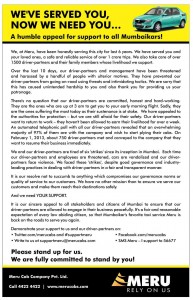On Feb 4th, major newspapers in Mumbai carried a fervent (and a rather long one as well) appeal from Meru Cabs, asking the lay public for support, something that went like, we served you now, support us. Saying it in short, the ad talked about how hoodlum practices had forced the company to stop its operation and how in spite of almost all the drivers wishing to return to work, they were not let to, by a “handful of people with ulterior motives”. At the end, there was a business plea, to let a corporation carry out its business unhindered by political machinations.

For many of us in Mumbai, the current Meru fracas is certainly not a new one. Over the past year or two, it has become a regular affair. Over some trifle issue or the other, the olive-green taxis will be off the road, and after some reconciliation they will be back. Only for the same cycle to repeat all over again. In fact, the ad itself mentioned that the company has suffered such “strikes” 6 times in the past two years. None of the competitors, the Mega, the Easy or the Tabs, have faced such issues. So, what exactly is the company doing so wrong that it’s facing such backlash again and again?
Curiosity finally, got the better of me, and I started Googling on the subject and asking my friends in the industry to find out how and why things had come to such a pass. And here’s how the story unfolded. Starting off in this very city of Mumbai in 2007, Meru today is India’s largest radio taxi operator and world’s 3rd largest company, operating some 5500 cabs in metros like Delhi, Bangalore and Hyderabad, in addition to Mumbai. Statistically, Meru serves more than a million passengers a month; executing over 20,000 trips on a daily basis (it even holds a Limca Book of Records for the same).
Now, just as Redmond is synonymous with Microsoft or Atlanta with Coca-Cola, or even closer home how Bangalore is synonymous with Infosys, Mumbai and Meru have an intrinsic connection. In fact, it should be a matter of pride for all of us that in a short course of half-dozen years, a start-up from the city attained such success that it was even featured in WSJ or even as a Wharton case-study. Meru’s success is symbolic of Mumbai’s entrepreneurial acumen, where if you have a great idea and a determined will nothing can come in the way to success. Except possibly for politically-aligned trade unions.
Time for flashback. When Meru started operations back in 2007, we Mumbaikars were completely at the mercy of the city cabs (referred locally as kaali-peeli). Hyper-inflated bills, rowdy behaviour, rash driving, and others were all the calling cards of the kaali-peeli. Commuters were helpless in front of these cab-wallahs, who ran according to a writ of their own. In this mire, appears Meru, a professional run-taxi operator, that delivers a swanky sedan at your door, with a civil driver and a mechanism to ensure no over-charging. While over the years, Meru added a lot many features to their cabs, like web-booking, credit-card payment, etc., the earlier 3 were its only USP. Continue reading
